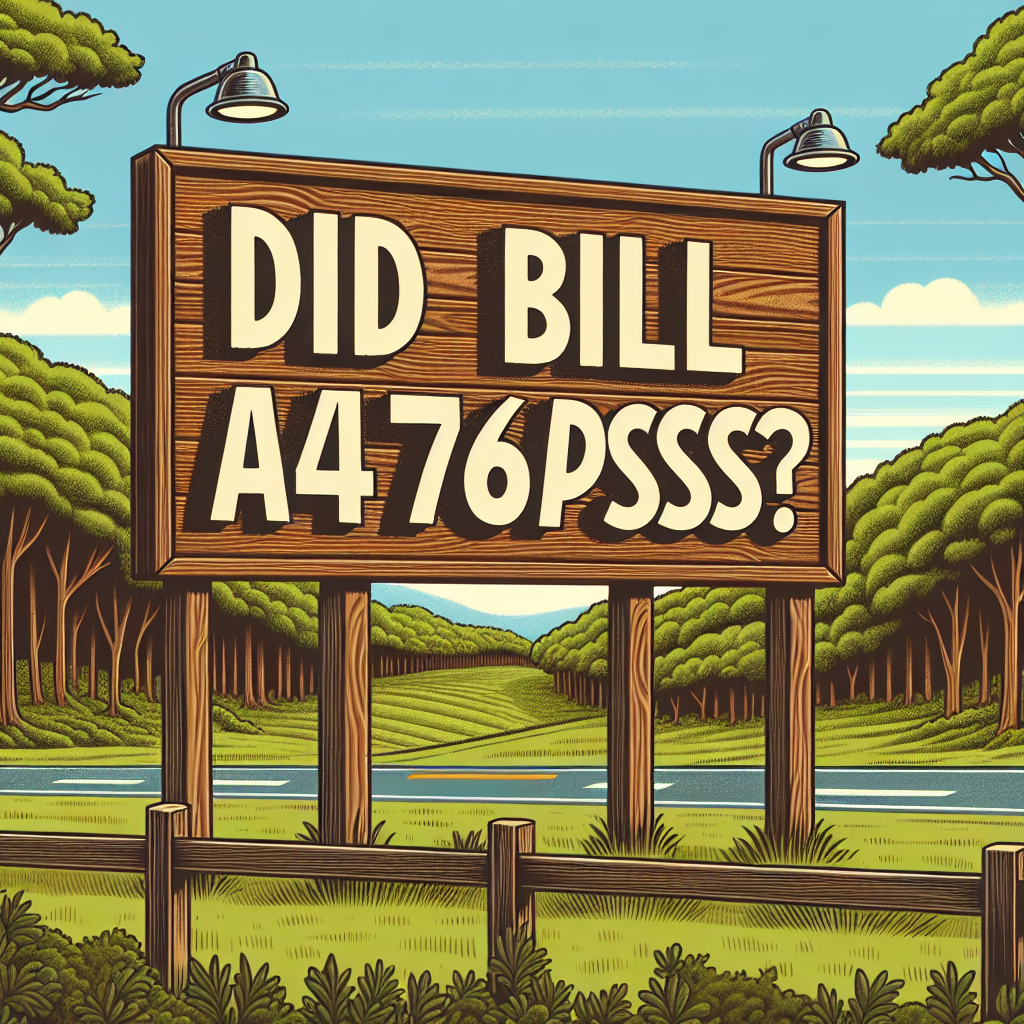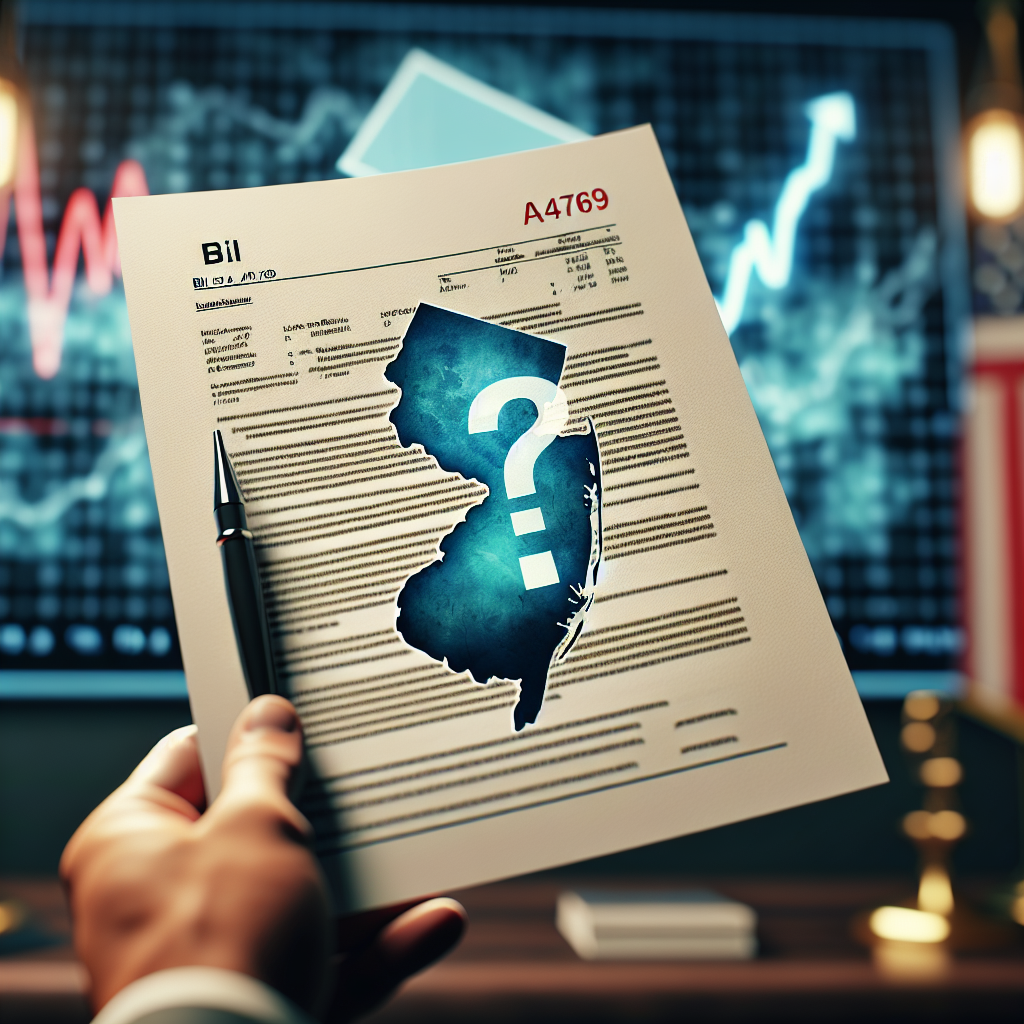Did Bill a4769 pass in NJ?

Understanding the Requirements and Process of Passing the Bill a4769 in NJ
Did Bill a4769 pass in NJ?
Understanding the Requirements and Process of Passing the Bill a4769 in NJ
In the world of politics, the passing of bills is a crucial aspect of the legislative process. Bills are proposed laws that undergo a series of steps before they can become official legislation. One such bill that has garnered attention in New Jersey is Bill a4769. This article aims to provide a comprehensive understanding of the requirements and process involved in passing this bill in the state of New Jersey.
To begin with, it is essential to understand the purpose and content of Bill a4769. This bill, also known as the “New Jersey Clean Energy Equity Act,” aims to address the issue of energy affordability and accessibility for low-income households in the state. It seeks to establish a program that would provide financial assistance to eligible households, enabling them to access clean and renewable energy sources. The bill also aims to promote energy efficiency and reduce greenhouse gas emissions.
In order for a bill like a4769 to become law, it must go through several stages in the legislative process. The first step is the introduction of the bill in either the Senate or the Assembly. In the case of Bill a4769, it was introduced in the Assembly by Assemblywoman Valerie Vainieri Huttle. Once introduced, the bill is assigned to a committee for review and analysis.
The committee stage is crucial as it allows for a thorough examination of the bill’s content and potential impact. During this stage, committee members may hold hearings, gather expert opinions, and make amendments to the bill. In the case of Bill a4769, it was referred to the Assembly Telecommunications and Utilities Committee for review.
After the committee stage, the bill moves on to the floor of the respective chamber for a vote. In this stage, all members of the Senate or Assembly have the opportunity to debate the bill and express their opinions. Once the bill is voted on and approved by the chamber, it moves on to the other chamber for a similar process. In the case of Bill a4769, it was approved by the Assembly and subsequently referred to the Senate for consideration.
Once the bill has been approved by both chambers, it is sent to the Governor for final approval. The Governor has the power to sign the bill into law, veto it, or take no action, in which case the bill becomes law after a specified period of time. In the case of Bill a4769, it is currently awaiting action by Governor Phil Murphy.
Passing a bill like a4769 requires careful consideration and collaboration among legislators, stakeholders, and the public. It is essential to ensure that the bill addresses the needs of the community and aligns with the state’s overall goals and priorities. The process of passing a bill can be lengthy and complex, but it is a vital part of the democratic process.
In conclusion, Bill a4769, also known as the “New Jersey Clean Energy Equity Act,” is currently in the process of being passed in the state of New Jersey. This bill aims to address energy affordability and accessibility for low-income households and promote clean and renewable energy sources. The bill has gone through several stages, including introduction, committee review, floor votes, and is currently awaiting action by Governor Phil Murphy. The passing of bills is a crucial aspect of the legislative process, and it requires careful consideration and collaboration among various stakeholders.
Analyzing the Potential Impact of Bill a4769 on NJ’s Economy and Society

Did Bill a4769 pass in NJ?
Bill a4769, also known as the “New Jersey Economic Recovery Act of 2020,” has been a topic of great interest and speculation among residents of the Garden State. This bill, which was introduced in the New Jersey Legislature in September 2020, aims to stimulate economic growth and create jobs in the state. However, the question on everyone’s mind is whether or not this bill has passed and what its potential impact could be on New Jersey’s economy and society.
To answer this question, we must first look at the legislative process that a bill goes through in order to become law. After being introduced in the Legislature, a bill goes through several stages, including committee review, floor debate, and voting. If a bill receives enough support from lawmakers, it can then be sent to the governor for approval or veto.
As of the time of writing, Bill a4769 has not yet been signed into law by Governor Phil Murphy. However, it is important to note that the bill has made significant progress in the legislative process. It has already passed both the Senate and the Assembly, which indicates a strong level of support from lawmakers. This suggests that there is a good chance that the bill will eventually be signed into law.
If Bill a4769 does become law, it could have a significant impact on New Jersey’s economy. One of the key provisions of the bill is the creation of the New Jersey Economic Development Authority (NJEDA), which would be responsible for administering various economic incentive programs. These programs would provide financial assistance and tax incentives to businesses that choose to invest in New Jersey, thereby encouraging economic growth and job creation.
Additionally, the bill includes provisions for the creation of a new tax credit program called the “New Jersey Innovation Evergreen Fund.” This program would provide funding for startups and small businesses in innovative industries, such as technology and biotechnology. By supporting these industries, the bill aims to attract new businesses and talent to the state, further boosting economic growth.
Furthermore, Bill a4769 also seeks to address some of the social and environmental challenges facing New Jersey. The bill includes provisions for the creation of a “Community Collaborative Initiative,” which would provide funding for community development projects in underserved areas. This initiative aims to promote social equity and improve the quality of life for all residents of the state.
In terms of the potential impact on society, the bill also includes provisions for the creation of a “Green Economy Task Force.” This task force would be responsible for developing strategies to promote sustainable and environmentally friendly practices in various sectors of the economy. By prioritizing sustainability, the bill aims to protect the environment and mitigate the effects of climate change.
In conclusion, while Bill a4769 has not yet been signed into law, it has the potential to have a significant impact on New Jersey’s economy and society. If passed, the bill could stimulate economic growth, create jobs, and address social and environmental challenges in the state. As residents of New Jersey eagerly await the governor’s decision, it is clear that the potential impact of this bill is a topic of great importance and interest.
Exploring the Controversies and Debates Surrounding Bill a4769 in NJ
Did Bill a4769 pass in NJ?
The passing of Bill a4769 in New Jersey has been a topic of great controversy and debate. This bill, which aimed to address several issues related to public safety and criminal justice, has sparked intense discussions among lawmakers, activists, and citizens alike. While some argue that the bill is a necessary step towards a more equitable and just society, others believe that it poses significant risks and challenges. In this article, we will explore the controversies and debates surrounding Bill a4769 in NJ.
One of the main points of contention surrounding Bill a4769 is its impact on law enforcement. Supporters of the bill argue that it provides much-needed accountability and transparency for police officers, particularly in cases of misconduct or excessive use of force. They believe that by requiring officers to wear body cameras and mandating the release of footage in certain situations, the bill will help build trust between law enforcement and the communities they serve. Additionally, the bill includes provisions for enhanced training and de-escalation techniques, which proponents argue will lead to safer interactions between police and civilians.
However, opponents of the bill express concerns about the potential consequences of these measures. They argue that requiring body cameras for all officers may place an undue burden on police departments, both financially and logistically. Additionally, they worry that the release of footage could compromise ongoing investigations or unfairly portray officers in a negative light. Critics also question the effectiveness of de-escalation training, suggesting that it may not always be practical or feasible in high-stress situations. These concerns have led to heated debates about the balance between police accountability and the need for effective law enforcement.
Another controversial aspect of Bill a4769 is its impact on the criminal justice system. The bill includes provisions for bail reform, aiming to reduce the reliance on cash bail and address issues of inequality within the system. Supporters argue that this will help prevent individuals from being detained simply because they cannot afford bail, leading to a fairer and more just process. They also believe that the bill’s focus on rehabilitation and diversion programs will help reduce recidivism rates and promote successful reintegration into society.
However, opponents of the bill raise concerns about public safety and the potential for individuals accused of serious crimes to be released without sufficient safeguards. They argue that the elimination of cash bail may allow dangerous individuals to walk free, posing a risk to communities. Critics also question the effectiveness of rehabilitation programs, suggesting that they may not always address the root causes of criminal behavior. These debates highlight the complex nature of the criminal justice system and the challenges of finding a balance between punishment, rehabilitation, and public safety.
In conclusion, the passing of Bill a4769 in New Jersey has sparked intense controversies and debates. While supporters argue that the bill promotes police accountability, transparency, and a fairer criminal justice system, opponents express concerns about the potential consequences and risks involved. As the discussions continue, it is crucial to consider the various perspectives and weigh the potential benefits and drawbacks of this legislation. Only through open and informed dialogue can we hope to find solutions that address the needs and concerns of all stakeholders involved.



